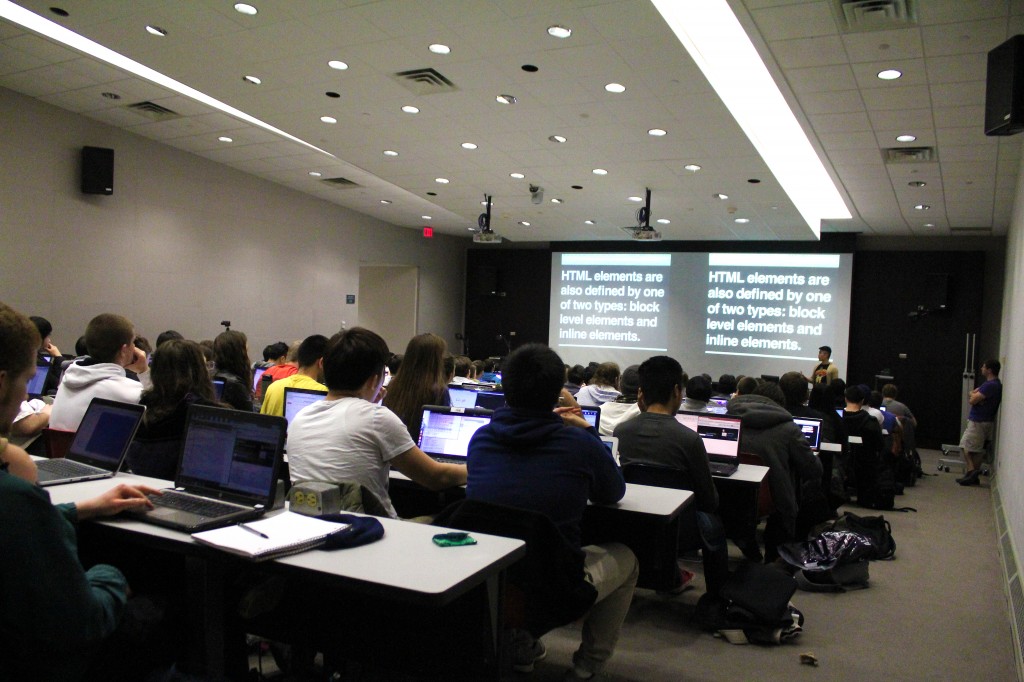
Binghamton University students don’t need to take a computer science course to learn web coding, thanks to a project started by one BU student.
HackBU was started by Daniel O’Connor, a senior majoring in computer science. It aims to teach students from various academic backgrounds about coding, to create a deeper understanding and appreciation for the software used every day.
The club also aims to increase BU’s standing among schools like Princeton University and Pennsylvania State University, which have a large, thriving computer science community. Club members are planning Binghamton’s first Hackathon from April 25-26, where teams of hackers would come together to create the best web application in a given time span. Besides the prizes and giveaways, participants have the chance to network with representatives from large web companies like Google and Facebook.
O’Connor said he was sitting on the idea of HackBU for a while.
“I’ve just needed some people to motivate me to actually go with it, so last semester we went to this Hackathon called MHacks at the University of Michigan,” O’Connor said. “We had about 18 Binghamton students and went for two days, took a ten-hour bus ride, and some of those students came back really excited about the Hackathon and wanted something like that at Binghamton.”
The organization hosts weekly workshops on Thursday nights to teach students about coding for free. At these workshops, students can develop personal websites and other web applications.
Adam Almonte, a junior majoring in computer science who attended this week’s HackBU workshop, praised the inception of the program.
“I think Binghamton really needed something like this, not only to help people brush up on this stuff but also to help people learn because websites are in really high demand nowadays,” Almonte said. “Technology is really taking over, and I think there is going to be a point in the future where everybody is going to be expected to know how to code, just like people nowadays are supposed to learn a foreign language.”
HackBU, however, is not just for computer science students; according to its website, two-thirds of HackBU members have no prior programming experience.
Joanie Danahy, a senior majoring in sociology, said that she wants to learn coding for the advantages it provides, especially in the job market.
“I think that knowledge is power, and so much of our society is oriented this way, the more you understand about coding the more empowered you are,” Danahy said. “Also, I feel that with hiring and for career purposes, it’s very important to have Internet presence so personally, I’m here to learn how to have my own webpage to represent myself and as a resource for networking.”
Currently, HackBU has over 500 people on its mailing list and six members on its E-Board. These members will take over HackBU when O’Connor graduates this semester, and are in contact with the Association for Computing Machinery (ACM), the computer science club on campus, about a potential partnership.
Itai Ferber has a few ideas about where he’d like to see HackBU go in the future.
“I’d love to see HackBU branch off into two groups,” Ferber said. “One dedicated to beginner students and non-CS majors who are interested in learning basic programming and web development, and another dedicated to advanced students who are interested in more advanced subjects, or additional help with their coursework.”
One of O’Connor’s biggest hopes for HackBU is to spread his passion to others within the computer science program.
“I wish that more Binghamton computer science students would realize that your GPA really isn’t everything,” O’Connor said. “I would like to see HackBU change that mentality of just studying for the test and make people actually excited about computer science, excited about programming, creating their own side projects, creating their own businesses.”


